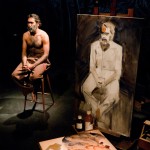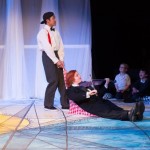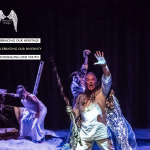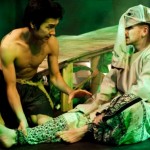Bound
Genre: Drama
Venue: The Vault, Southwark Playhouse, Shipwright Yard, (Corner of Tooley St. & Bermondsey St.), London, SE1 2TF
Low Down
‘My soul has been torn and I am leaving’. These are the first words of the Boundperformance: they resonate in the darkened auditorium as the sonorous voices of the six cast members fill its cavernous space. Then in a beat, in full light, a young man appears before the audience surveying his location, looking right and left, above and around, pulling curious facial expressions that elicit much laughter from the audience. The contrast between the male voices singing out their mournful words and the curious young man with his funny facial expressions reflects something of the turbulent emotions the audience is about to experience in Jesse Briten’s play about “the fortunes of six trawlermen from Devon as they embark on one final voyage…into treacherous weather.” Using elements of political theatre and expressionistic drama, by the end of the play, the audience witnesses how the fishermen are bound to the sea in more ways than just for their economic survival.
Review
There was a time, particularly in the 1960s and 70s, when the term ‘the well-made play’ was used as a term of denigration. But I couldn’t help observe how Boundshows the effectiveness of well-made plays: the expositions of key ideas in the opening scenes; the use of a strong dramatic plot rising towards a climax; and the logical resolution of the action in the closing moments of the drama.
The play’s strength is Jesse Briten’s crafting as a playwright of a number of interrelated dramatic conflicts: the first we see is that of the Devon trawlermen getting caught up in a display of open hostility towards a Polish agency worker. This is strongly developed by James Crocker as John, Alan Devally as Alan, Joe Darke as Graham, Daniel Foxsmith as Rhys and Thomas Bennett as Kerdzic aka Kirk. Fused together are parochial prejudices and work-class paranoia of ‘migrants taking our jobs’ and, ironically, the characters’ upbeat expectations that the Pole is unnecessary anyway since the fishing season is over and they are on the docks waiting for the skipper to give them their payoffs after a bumper catch. The complex layering of internalised tensions and externalised hostilities make the scene anything but formulaic or melodramatic. Instead, ironic tensions, built by juxtaposing the men’s bravado and uncertainties, expose their depth of feeling and continuously disrupt any easy reading of the dramatic action. I am reminded of watching plays by Irish playwrights Sean O’Casey and J M Synge.
Furthermore, Briten never seems to position the audience to abandon their compassion for the men who are shown capable of changing their stance towards the Polish Kerdzic and being resilient enough to act as a ‘band of brothers’. Any sentimentality that comes from the scenes of working-class males baiting each to extract maximum humiliation exists alongside their choice to face death for one another. This is the mateship of: the trenches of WW1; the Dunkirk rescue in WW2; the workers in coal mines, on oil-rigs and in other primary industries with historical links to a once fierce unionism and left-wing politics. I noticed, for instance, that the song ‘Bound For South Australia’ was used in the show and that the play went to the Adelaide Fringe Festival. The cultural resonances with mateship and the identification of the ‘underdog’ seem an interesting residue of former performances.
Joe Darke’s musical and movement direction brings much to the development of this complex play. The tradition of ‘folk song’ that runs through Celtic and other early English indigenous cultures lives on in it through the beauty of the songs themselves. They are transformative and give credence all the characters’ yearning to belong. The decision to let movement evoke ‘men at work’ is inspired as it reifies what otherwise exists as ordinary everyday actions by ordinary men.
Bud Jones’ design of unadorned table, chairs and bright yellow storm-weather gear is also highly effective. While not novel, the fact that the set design has no ‘wings’ masking the actors upstage works well with the hold and release style of movement which punctuates different episodes in the play. Most of all, from where I sat, the open stage allowed the audience to imaginatively keep alive the expansive ocean on which ‘The Violet’ existed: and so the drama was free, both metaphorically and literally speaking, to float, bob up and down and violently sway right up until the end. It is a technique we see used in the storm scene of Act 1, Scene 1 of Shakespeare’sTempest and its power comes from viewing the helplessness of mere men caught up in a maelstrom. Briten’s use of irony in the final moments of the play as Graham and Rhys attend to the injured Kerdzic at the height of the storm marks the drama with the heroism of decent men who in helping their fellows still remain utterly afraid.
Ultimately, the question that the play asks the audience is: what’s worth living and dying for? The relationship between the skipper Woods (John McKeever) and his business partner and first mate John (James Crocker) highlight how it is the crux of the matter and why they find themselves out at sea in a storm: the manic skipper Woods whose lack of sleep betrays his fear of humiliation at the prospect of losing his boat is played out in a poignant scene with the gentler, more risk-adverse John. These are not only representations of two different men but of two different ways of living that paradoxically link progress and destruction in the human condition.
Bound warrants all of the praise it has received since it opened at the Edinburgh Fringe Festival in 2010. From reading some past reviews, I suspect there may have been minor changes which have further strengthen it for its current production now at Southwark Playhouse. Like O’Casey and Synge’s well-made plays, I believe thatBound will be restaged in the future. I’m returning to view it again next week with my family and friends. Its intelligence and inspirational qualities deserves more than just one viewing.
Reviewed by Josey De Rossi Thursday, 29th September 2011
Website :
http://southwarkplayhouse.co.uk/the-vault/bound/
http://www.bear-trap.co.uk/





